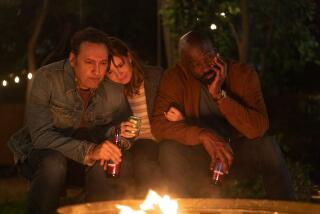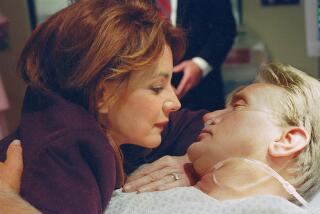‘The Americans’ show runners look back on Season 4
The fourth season of FX’s “The Americans” was hellbent on apocalyptic destruction. The characters spent an episode pondering the aftermath of nuclear escalation with the airing of the 1983 TV movie “The Day After.” They smuggled experimental bio-weapons out of the country, occasionally with disastrous results. Facades began to crack under the growing threat of global warfare.
But what if the most destructive force on “The Americans” wasn’t nukes? What if it were love?
“Metaphor’s a tricky thing in our process, particularly when you’re dealing with spying and relationships and biological weapons and feelings,” says Joel Fields, co-show runner of “The Americans,” who, alongside creator Joe Weisberg chatted with us ahead of Wednesday’s season finale. “We try to identify them and then set them aside.”
But whether they’re actively incorporating those metaphors or not, the creators contend that the series, set at the height of the Cold War, is less about international espionage and more about a marriage.
The series is centered on Elizabeth (Keri Russell) and Philip Jennings (Matthew Rhys), a pair of Russian spies who conduct their spy-work while posing as a prototypical American family, replete with two children and an FBI agent living next door. “The Americans” has continued to examine Philip and Elizabeth’s relationship, which is tested by forces both typical and atypical to matrimony.
For instance, Philip’s marriage to another woman.
“We knew this was a love affair that was going to run for a long time,” Weisberg says of the relationship between Clark (one of Philip’s aliases) and Martha (Alison Wright), an FBI secretary who, slowly, comes to realize she is married to a spy. But what exists between Martha and Philip by the time he, in a risky move, admits his ulterior motives to her is more real than anyone could have originally imagined.
“Therapists are aware that transference works both ways, so they know how to manage that,” Fields explains of Philip’s genuine love of Martha. “You’d hope that spies who are running relationships might be able to do the same, but at some point real emotion can’t help but take hold.”
That’s not to say that Philip feels as deeply for Martha as he does Elizabeth but, when Martha is extradited to Russia for her own safety, Philip feels genuinely bereft, which befuddles his wife.
But Elizabeth suffered a loss of her own after unintentionally bonding with, and then being forced to cut ties from, a Mary Kay saleswoman in order to gain access to information about U.S. bio-weaponry held by her husband.
“Here’s Elizabeth, who has seemed so impenetrable, but who we know through her relationship with her family has a real soul there, forging this unexpected connection and allowing an opportunity to see how trying this job can be on even the toughest of soldiers,” Fields says.
“There’s something very beautiful about it, very hopeful,” Weisberg adds. “But just like the Martha relationship we know it’s doomed. We hope that it’s not, but we know better. That’s the tragedy of it.”
Yet perhaps there is still time to avoid the unavoidable. With a recent order from the network for a fifth and sixth (and final) season, Weisberg and Fields have the luxury of a precise timeline with which to plot their endgame and to deliver their characters to the fates they’ve been rocketing toward since the pilot.
“Philip has been transforming since the beginning,” Weisberg says.
“Elizabeth is on the path of transformation,” Fields adds, “it’s just much slower and in a radically different way. That’s the great challenge of marriage: It’s two different individuals on two different paths choosing to take them together.”
Fields argues that may just be what love is, quoting Leonard Cohen’s “Anthem.”
“There is a crack in everything. That’s how the light gets in.”
More to Read
The complete guide to home viewing
Get Screen Gab for everything about the TV shows and streaming movies everyone’s talking about.
You may occasionally receive promotional content from the Los Angeles Times.







